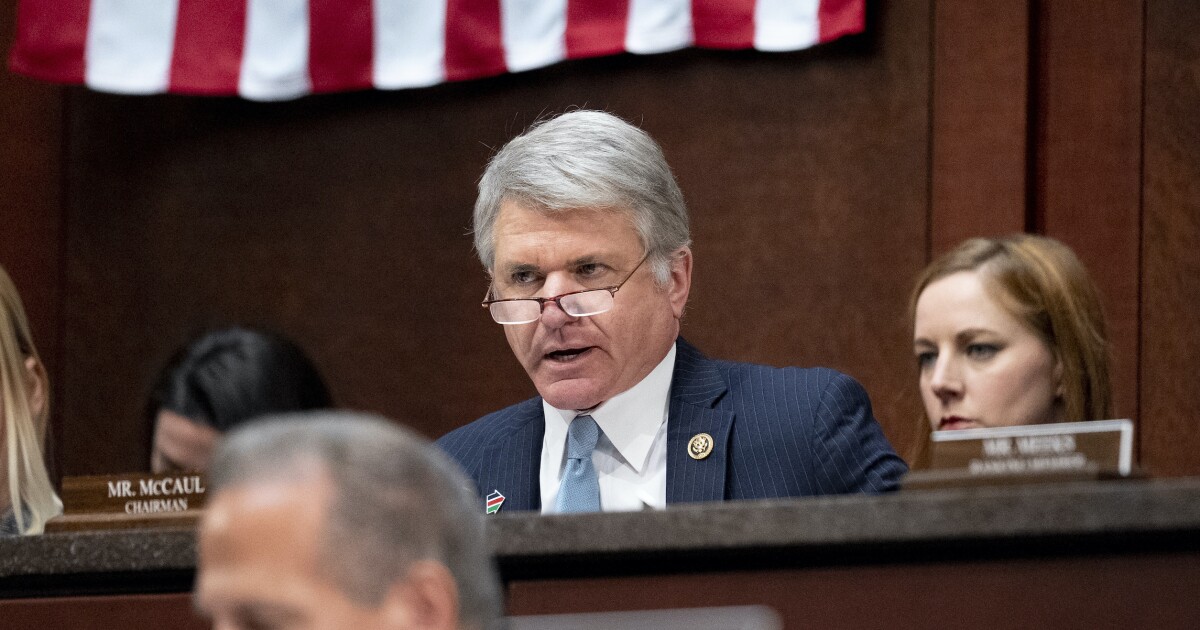

A bipartisan push to check the president’s war powers could soon fall victim to mission creep as the House takes up legislation that would mark a formal end to the Gulf and Iraq wars.
The Senate voted last Wednesday to repeal the authorizations for use of military force, or AUMFs, that Congress passed in 1991 and 2002 to greenlight the conflicts.
AUMF MIRAGE: REPUBLICANS STILL HAWKISH ON WAR POWERS DESPITE SUPPORT FOR REPEAL
The resolution, sponsored by Sens. Tim Kaine (D-VA) and Todd Young (R-IN), now heads to the House, where Speaker Kevin McCarthy (R-CA) said last month it has a “good chance” of coming to the floor for a vote.
Yet the measure, which passed the lower chamber last Congress before dying in the Senate, must first make its way through the House Foreign Affairs Committee, where Chairman Michael McCaul’s (R-TX) approach to repeal threatens to derail the yearslong effort.
McCaul wants to avoid “piecemeal” consideration of the president’s war powers and hopes to “repeal and replace” a third AUMF, the one passed in the days after 9/11, along with the Iraq authorizations.
“It’s frankly a sign of weakness to Iran to be doing this without any sort of replacement,” McCaul told Punchbowl News. “I’d be in favor of the 2001 repeal, and I have a replacement. We should update it with the modern threats.”
While the repeal of the 2002 AUMF would be largely symbolic — the war ended more than a decade ago, and the White House says it would have “no impact” on military operations — touching the 2001 authorization would not.
The 9/11 AUMF has been used by four administrations as legal justification for counterterrorism operations in at least 22 countries.
Kaine and Young have for years sought to update the resolution, arguing that an authorization meant to punish the perpetrators of the 9/11 attacks has since been stretched to target militia groups that have nothing to do with the original threat.
Yet Kaine and Young intentionally left it out of the Senate legislation for fear it could not attract enough votes.
Even the White House acknowledges the 2001 AUMF is outdated. But that’s where the consensus ends. Negotiations over what to replace the authorization with could prove tricky and might fall apart as lawmakers debate how expansive or narrow the new AUMF should be and whether it should sunset.
For that reason, the senators instead decided to take an incremental approach with hopes they could build a congressional appetite for reforming the 9/11 authorization down the road.
“We thought that this should remain clean to maximize its chance of passage in the House,” Young told the Washington Examiner. “If we can build the muscle memory, our thinking was, to restore, reclaim, and reaffirm our war powers, then that lays a predicate for success on the ’01 reform.”
Kaine, for his part, is optimistic their legislation can make it through the Foreign Affairs Committee. He cited the growing support it has from Republicans who opposed repeal as recently as two years ago. Notably, McCarthy and Rep. Mike Rogers (R-AL), the House Armed Services Committee chairman, are now in favor.
“The House Foreign Affairs Committee chair is not 100% for it, but he’s sort of caveating his opposition,” Kaine told the Washington Examiner.
But there is widespread acknowledgment that adding 2001 into the mix could complicate the measure’s passage.
“It makes it much more challenging to get to the finish line,” Sen. Ben Cardin (D-MD), one of the biggest proponents of repealing the 2001 AUMF, told the Washington Examiner.
Cardin, who introduced his own 2001 repeal last week, said he’s supportive of McCaul exploring a “repeal and replace” strategy if he seeks input from the president and Senate.
“If we can reach the sweet spot on ’01, it would be worth the effort,” he added.
Yet he expressed the same reservations that are top of mind for Kaine and Young. “I don’t want to see it jeopardize getting something done,” Cardin said.
The effort by McCaul is a nonstarter for Sen. Lindsey Graham (R-SC), a defense hawk who opposed the Kaine-Young legislation.
Graham proposed his own “repeal and replace” language, except only for the 2002 AUMF. He offered an amendment to the resolution giving the president authority to target Iranian proxies in Iraq, but it failed 36-60 on the Senate floor.
The senator laughed when asked if he would entertain a repeal and replace that touches 2001.
“No,” he told the Washington Examiner. “Maybe I missed it — is the war on radicalism over and I just didn’t pay attention? That they said, ‘We’re going to leave you alone. Everything’s good. We’re OK with you’? When that is said and they follow through with it, give me a call.”
Kaine suggested the whole conversation could be moot if the House decides to go a different route and adds the legislation to Congress’s annual defense bill, the National Defense Authorization Act, as an amendment.
CLICK HERE TO READ MORE FROM THE WASHINGTON EXAMINER
Young said while that solution would not be ideal, he sees it as an “obvious opportunity.”
“Listen, around here, we’re going to accept whatever vehicle may come along,” Young said. “In an ideal world — and this isn’t one of those — I would hope for a stand-alone vote so that members would have an opportunity to register their views on this topic, unadorned by — uncomplicated by other matters.”





